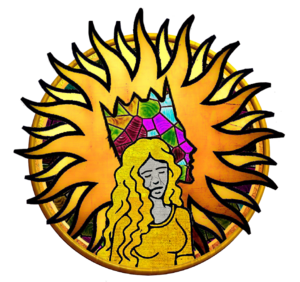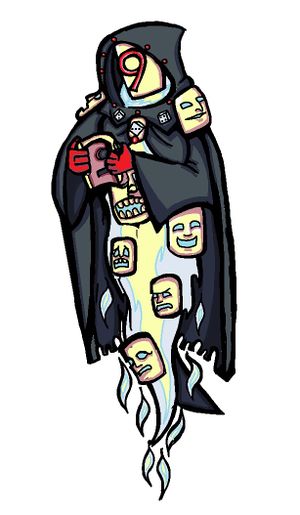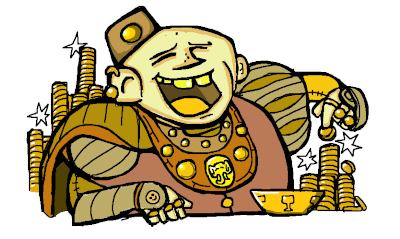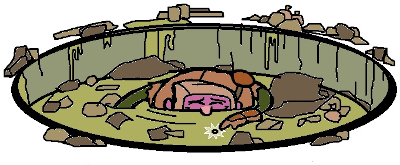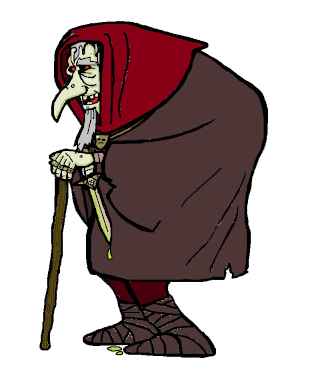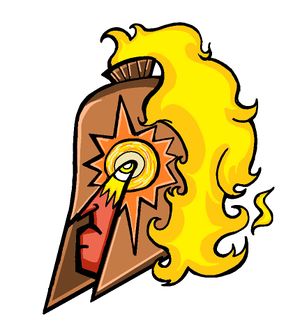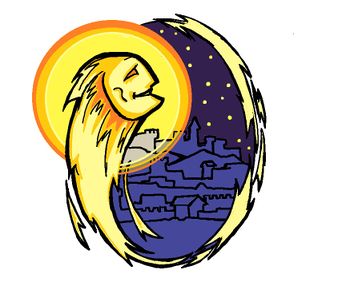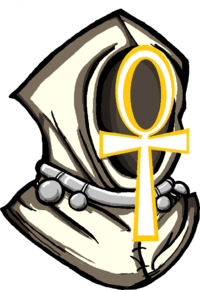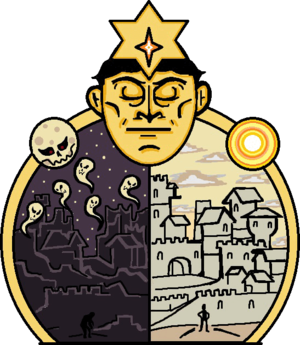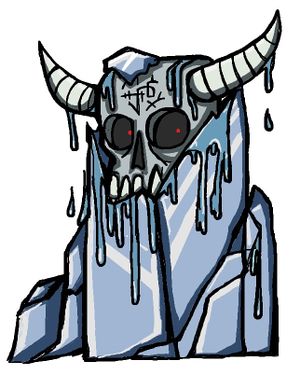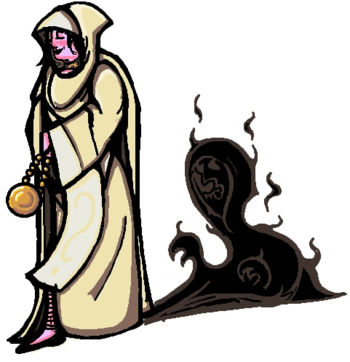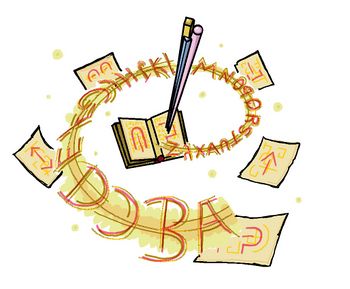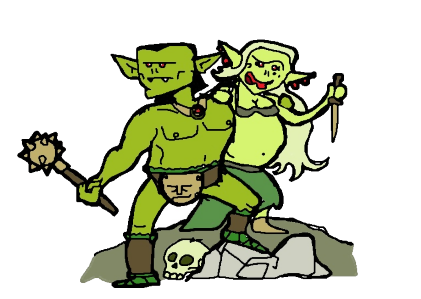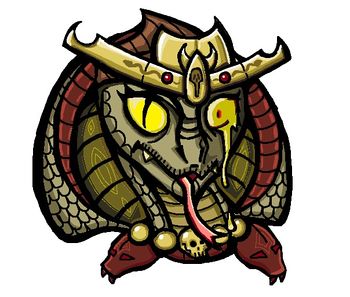Small Gods of the City (Local Faiths): Difference between revisions
No edit summary |
mNo edit summary |
||
| (70 intermediate revisions by 7 users not shown) | |||
| Line 1: | Line 1: | ||
=Common Faiths= | ==NOTICE== | ||
This page exists as a historical reference to beliefs and taboos that existed in Chapter 5: The City of Rings. The beliefs here are obsolete, many of which have fallen out of fashion even in refugees arriving from that chapter, and certainly do not prevail in the Sands of Intrigue. No directory of the wiki should lead here. | |||
==The Lord & Lady== | |||
[[File:Triune.png|Frameless|300px]] | |||
'''Associated Domains: Nobility, Law, Sun, Travel, War, Protection''' | |||
'''Focus: The Peerage''' | |||
'''Special Requirements: None''' | |||
The faith of the Lord & Lady is the organised religion of the Peerage Ward, endorsed by the Royal Archives and (supposedly) practised by all members of the nobility and their sworn vassals. The centre of the mythology revolves around the Lord Departed, who once ruled over the Peerage Ward but left to undertake a quest of errantry to vanquish a Great Evil, leaving his newborn child (often interpreted as a euphemism for the Peerage Ward) in the care of his Lady-in-Waiting - with a Promise made through the blood of their child that he would one day return to her. Several different interpretations of this myth exist, though all of them revolve around this core plot and character archetypes. | |||
This broad religion is the parent faith of three component parts - the Lady-in-Waiting, the Lord Departed, and the ancient sun deity known as the Promise. As the primary foundation on which the social structure of the Peerage Ward rests, all citizens of the Ward are expected to profess devotion to this faith - to do otherwise is to invite suspicion, social rejection and potentially even accusations of heresy or dreaded Changeling witchcraft... | |||
Followers of the Lord & Lady are expected to adhere to several commandments, which form the cornerstone of the faith: | |||
1. To obey their sworn liege, and defend them and their honour unto death. | |||
2. To be loyal to the King. | |||
3. To attend Communion. | |||
4. To be true to their word. | |||
5. To condemn other faiths and all Changelings. | |||
Essential to correctly following the Lord & Lady is rejecting other religions as evil and sinister. Only the Lady-in-Waiting and the Lord Departed are bound by the sacred Promise, and so all other deities who seek worship and prayer are tricksters and charlatans who threaten the feudal order and the lawful oaths between a liege and their vassals. Whilst Peers are not expected to be violent towards the unfaithful, it is socially frowned upon to be seen in the company of heretics and making use of their magic or blessings is perceived as sinful and potentially even criminal. | |||
Crucial to being seen as a 'proper' devotee of the Lord & Lady is regular attendance at Communion, a sacred ritual which sees the entirety of the Peerage Ward gather at the Grand Vestry to receive a sermon from a member of the ordained clergy. During this ritual, attendants will perform the Rite of Fealty, wherein an offering of blood is made before the altar as a renewal of oaths and promises - be it to friends, family, business partners or one's liege. As the left palm is commonly used as the cutting place for drawing blood during the Rite of Fealty, having a 'Fealty Scar' on one's left palm is generally regarded as a sign of piety and is an easy way of checking whether another person is a member of the faith. Attendance at Communion is almost always rewarded with prestige, and also serves as an opportunity for particularly noteworthy individuals who have achieved deeds of merit to be acknowledged and praised by the faithful community. | |||
Players of this faith should generally be superstitious and pay close attention to the piety of other practitioners. A culture of 'competition' to be seen as the most devout is encouraged, and the sacredness of blood as a symbol for trustworthiness and unbreakable promises should be represented in roleplay. Members of House Nephezar and House Sunpurse are the most likely to have this religion feature heavily in their roleplay and faction portrayal, though players from other Houses will also have this religion feature in their roleplay - be they devout practitioners or otherwise. | |||
Practitioners of the Lord & Lady faith have a small selection of religious gestures unique to their culture: | |||
1. Placing three fingers over the heart when an oath is sworn indicates a pious intention to carry out this duty, and a belief that the oath has been witnessed by the Lord, the Lady and the Promise. | |||
2. Tapping the underside of the wrist several times is considered a gesture to ward off evil and bad omens. | |||
3. Pressing the forefinger and ring-finger of the right hand into the palm of the left - where the Fealty Scar usually sits - indicates a plea to the Lord & Lady for courage and strength. Often done before a dangerous undertaking or a battle. | |||
Practicing secretive heretical doctrines, unorthodox behaviours, and otherwise being subtly deviant/controversial is allowed if it is suitable for your concept. Understand that doing so is likely to have severe IC consequences if discovered, but is likely to be narratively interesting and fun. Conversely, if religion is not a major theme of your character, it is encouraged for you to practice the religion dutifully and normally if you are a Peerage member. | |||
=''Common Faiths''= | |||
<big>''Although nominally outlawed, the following religious creeds are still popular among the people of the City, especially outside of the Peerage Ward.''</big> | |||
==The Nine Faced God== | ==The Nine Faced God== | ||
[[File:9god.jpg|Frameless|300px]] | |||
'''Associated Domains:''' | '''Associated Domains:''' | ||
| Line 16: | Line 58: | ||
'''Special Requirements: None''' | '''Special Requirements: None''' | ||
Followers of the Nine Faced God doubt the existence of any other true deity | Followers of the Nine Faced God doubt the existence of any other true deity at all and instead ascribe all other over-powers everywhere as simple manifestations of their god's many faces and aspects. The God is understood not to directly have specific faces (or, indeed, to possess any true form), but rather manifest itself in nine separate metaphysical directions that influence reality. Faith is heavily based upon obscure numerological principles, with different interpretations of the importance and meaning of respective numbers hotly contested and debated. Many followers carry with them certain special nine-sided die that they roll to offer guidance and wisdom. | ||
While followers will definitely argue and disagree about | While followers will definitely argue and disagree about the meaning of certain numbers, the following meanings are commonly ascribed: | ||
* 9 - Fortune, Luck, Chance, Possibility | * 9 - Fortune, Luck, Chance, Possibility | ||
| Line 30: | Line 72: | ||
* 1 - Fate | * 1 - Fate | ||
There is no particular creed or ideology that comes with | There is no particular creed or ideology that comes with this faith with followers tending to believe that the notion of trying to please a god through sacrifice or virtuous act is hopelessly naive. Instead, followers of the Nine Faced God simply know that they must go their own way, influenced at every step by the God's Nine Faces, until at last, they meet their final fate. | ||
Some followers tend to use the phrase "marked by <a number>" as a way to describe their own views and path. For example, "marked by nine" tends to mean that they have had a lucky life. A scholar might be "marked by four" or an explorer as "marked by five." | Some followers tend to use the phrase "marked by <a number>" as a way to describe their own views and path. For example, "marked by nine" tends to mean that they have had a lucky life. A scholar might be "marked by four" or an explorer as "marked by five." | ||
The faith of the Nine Faced God | The faith of the Nine Faced God is believed to be the most commonly held among those who dwell in the City of Rings. | ||
==Phanax of Opulence== | ==Phanax of Opulence== | ||
| Line 42: | Line 84: | ||
'''Associated Domains: Travel, Luck, Trade, Charm, Portal''' | '''Associated Domains: Travel, Luck, Trade, Charm, Portal''' | ||
'''Focus: | '''Focus: Wealthseekers, Hedonists, Politicians''' | ||
'''Special Requirements: None''' | '''Special Requirements: None''' | ||
| Line 52: | Line 94: | ||
He is followed by people from all walks of life; beggars, merchants and mercenaries pray to him to see both their purses and their wineskins filled; conmen, bards and socialites for gilded tongues and rapturous crowds; drunkards and hedonists for memorable nights. | He is followed by people from all walks of life; beggars, merchants and mercenaries pray to him to see both their purses and their wineskins filled; conmen, bards and socialites for gilded tongues and rapturous crowds; drunkards and hedonists for memorable nights. | ||
== | ==Pitter Peter== | ||
[[File:Pitter.jpg]] | |||
'''Associated Domains: Knowledge, Travel, Ooze, Cavern, Fungus''' | |||
'''Focus: Scumpickers, Hoarders, Paupers''' | |||
''' | '''Special Requirements: None''' | ||
The small god, known as "Pitter Peter" is the personification of the nearly endless piles of rubble and trash scattered throughout the City of the Rings. It is a covetous god of hoarding and collecting, and many scumpickers pay it tribute - If only to ensure their own findings are a little better than trash. One of its largest shrines is located on Trash Island. | |||
==Old Grandfather== | |||
[[File:Grandpa.png|Frameless]] | |||
'''Associated Domains: Evil, Death, Trickery, Darkness, Luck''' | |||
'''Focus: Knaves, Criminals, Shadows''' | |||
''' | '''Special Requirements: Non-Good''' | ||
There are many legends and fables about Grandfather, each a different telling, but the local thieves and criminal element of Ring 99, in particular, are quick to ask for a blessing from Old Grandfather before any heist or dark deed. | |||
' | Of particular note is "Grandfather's Code," a somewhat murky and ambiguous code of conduct that is meant to keep Grandfather pleased and avert ill-fortune. Those thieves who disregard "Grandfather's Code" are said to always come to a bad end. Notably, every thief seems to have their own version of Grandfather's Code. | ||
There are many fables and legends about Old Grandfather. In some, he is an actual thief who can pass through walls and steal piles of gold and rubies from greedy merchants. Others speak of his many dark servants that he calls up from the underworld to enact justice on his enemies. In others, he is a kindly old man who turned to the life of a gentleman thief after his family's inheritance was stolen by wild brigands. | |||
Most consider this faith as a mere superstition, born from campfire tales and clung to by superstitious thieves and desperados, however, there is no denying that the creed seems to have a certain enduring quality about it... | |||
==The Ancestors== | |||
''' | '''Associated Domains: Dwarf''' | ||
''' | '''Focus: Dwarves''' | ||
'''Special Requirements: Dwarf''' | |||
The faith of the Ancestors is known to the dwarves as one of the "true faiths"; believing that on their death they shall be enshrined in legend, to be remembered by their descendants and join their Ancestors - if they are judged to be worthy. The obsession with the legends of the faith takes importance over all else while attributing the most arcane of happenings to the will of the mysterious and spirit-like Ancestors who seem to whisper their sage haunting advice to only the most devoted dwarves. | |||
The great drive to become one of the Ancestors, to be judged worthy, has been known to drive some dwarves to truly insane, courageous and even vile acts all in the name of elevating themselves above the mundane. The faith itself is nested in a complex maze of legend, myth, superstition and ritualistic ceremony so deeply that it is hard for even those of the faith to keep them straight, perhaps in part leading to the practice of searching for a single Ancestor to devote themselves to. | |||
Players of this faith should generally be superstitious to some degree. The legends of the Ancestors that currently exist in-game will be grown over time and noteworthy PC dwarves of some obvious prominence will be added. It is highly encouraged for players of this faith to either follow one of the Ancestor legends already defined in the game world or to make up their own (this is in addition to broader worship of the Ancestors as a whole) to further define their personal faith. You need not begin singling out one but it should be a goal to discover one to ascribe to more personally above others. | |||
==The Lord Departed== | |||
'''Associated Domains: Magic, Knowledge, Sun, Spells, Nobility''' | |||
'''Focus: House Nephezar, Sorcery, the Golden City''' | |||
'''Special Requirements: None''' | |||
From the sacrosanct halls of House Nephezar to the meagre almshouses of the Mongrelwoods, righteous men and women of holy inclination whisper their prayers to the God who once reigned in heaven, awaiting the day He shall return in all His glory to make right all the evils in the world. These desperate prayers take many forms, from pleading to bartering to invitation, but all address the profound absence felt at Heaven's heart. This absence is what they believe has allowed evil and corruption to take root. | |||
' | Yet while the Lord has gone from heaven, He has not gone from the world—or so those of the faith believe. By inviting Him into one's heart, and living a life of purity, faith, and righteousness, the faithful makes ready God's throne for His renewed ascent. | ||
The House of Nephezar claim a miraculous descent from the Lord Departed and His Blessed Angels, and those among the faith are often drawn to the house, where they perform innumerable liturgies, prayers, and rites in their archaic tongue. | |||
The | ==The Sun== | ||
Among men, the objects which stir most strongly their faith are the primal and elemental forces they witness in motion every day. The most immutable and precious of these forces is the Sun. Accordingly, it is worshipped within the Rings by not one singular cult, but by several. Its followers deny the primacy of other sects and often engage in ritualized contests to prove the virtue of their individual cult. | |||
===Yeman, the Shining Lord=== | |||
[[File:Yeman.jpg|Frameless|300px]] | |||
'''Associated Domains: Sun, Law, Fire, Retribution, Strength''' | |||
'''Focus: The Sun, Glory, Perfection''' | |||
'''Special Requirements: Non-Chaotic''' | |||
The Sun in its aspect as a bringer of light and divine majesty to the Ring. Also called "the Burning Lord," acolytes can invoke His wrath against the unclean, the unworthy, the unsociable, and the meek. His followers praise bold action and noble bearing and despise those who are meek or indecisive. Magistrates, Inquisitors, and the prideful might call this faith their own. | |||
===El, the Sprinting Light=== | |||
[[File:Sprint.jpg|Frameless|350px]] | |||
'''Associated Domains: Sun, Chaos, Air, Travel, Storm''' | |||
'''Focus: The Sun, Freedom, Weather''' | |||
'''Special Requirements: Non-Lawful''' | |||
The Sun in its aspect as a fickle being of perpetual motion and change. El sprints jubilantly to the horizon each morning and races the winds across the skies each day, to rest behind the edge of the world each night, nestled in the arms of his gusty lover. To followers of this flighty faith, the Sun and Sky are one — divine wedlock of wind and light. Acolytes of this faith can invoke powers of motion and movement, can quicken feet and summon warm winds. The adventurous, the capricious, and the free might call this faith their own. | |||
' | ===Sa'i, Who Showeth the Way=== | ||
[[File:sai.png|Frameless|200px]] | |||
'''Associated Domains: | '''Associated Domains: Sun, Knowledge, Magic, Fate, Spells''' | ||
'''Focus: | '''Focus: The Sun, Prophecy, Arcana''' | ||
'''Special Requirements: | '''Special Requirements: None''' | ||
The | The Sun in its aspect as a bringer of morning revelations. He who Showeth the Way comes garbed in a robe of white light, and carries in one hand a gilded ankh whose shining loop unveils with utmost clarity the divine Truth of the world. His is the power to unveil the strands of a man's fate, and His are the keys to unlock every door. Acolytes of Sa'i can invoke great divinations and are gifted revelations of the ways of magic. | ||
The | ===The Promise=== | ||
[[File:promise.png|Frameless|300px]] | |||
'''Associated Domains: Sun, Death, Repose, Darkness, Healing''' | |||
''' | '''Focus: The Sun, Cycles, Redemption''' | ||
'''Special Requirements: None''' | '''Special Requirements: None''' | ||
The Sun in its aspect as a being in diaspora, eternally doomed to leave the skies to darkness, but likewise prophesied to forever return. The followers of this strange faith congregate when their object of worship has left the sky and plunged the world into night. They light torches, sing praises, and make a great show of remembering the Sun each night, that it might return to them. During the day they are at peace, confident in the assurance that their nightly rites have ensured the return of the day. Acolytes of this faith wield powers of hope and renewal, and through strange signs can banish the undead and sunder dark magic. | |||
=''Fringe Faiths''= | |||
<big>''Although the cults following these creeds are rare and small, they stubbornly endure in the remote places of the City.''</big> | |||
==The | ==The Renunciation== | ||
'''Associated Domains: Healing, Renewal, Suffering, Knowledge, Travel''' | |||
''' | '''Focus: Philosophers, Mendicants, Flagellants''' | ||
''' | '''Special Requirements: None''' | ||
' | Located in a distant monastery along the great sludge-canal of Ring 97, the mystery cult of the "Monastery of the Candid Hemlock" has become a new and bustling site of pilgrimage for the followers of a new path simply described as, 'The Renunciation.' | ||
According to the followers of this faith, existence - which they call "The Razor Web" - is a state of profound and continuous suffering that mortal selves find themselves entangled in. | |||
So what is the solution? To kill oneself? No, the Monastery claims they know of a better way to escape suffering, one which also helps others and therefore is altruistic. They claim they have received the answer to this existential conundrum from a prophet centuries ago, and ever since then, they have been the guardians and practitioners of this wisdom – a teaching that has the potential to save the entire world from suffering. | |||
Slowly, in increasing numbers, pilgrims have begun to try to find their way to this Monastery to learn about their path... | |||
==Pzatharun== | ==Pzatharun== | ||
| Line 190: | Line 230: | ||
'''Associated Domains: Chaos, Animal, Trickery, Illusion, Charm''' | '''Associated Domains: Chaos, Animal, Trickery, Illusion, Charm''' | ||
'''Focus: | '''Focus: Transformation, Depravity, Beauty, Mayhem''' | ||
'''Special Requirements: Chaotic''' | '''Special Requirements: Chaotic''' | ||
| Line 196: | Line 236: | ||
At heart, Pzatharun is a God of outcasts, unpredictable and whimsical in the blessings and curses they lay upon the realms of men. Associated with shapeshifting (magical or lycanthropic), changelings, disorder, bouts of mania, artistic inspiration, hedonism and fae. His nature and faith are shrouded in mystery and contradiction, with some saying Pzatharun is a lord of the Fae, others a planar embodiment of chaotic elements, among dozens of other conspiracies. | At heart, Pzatharun is a God of outcasts, unpredictable and whimsical in the blessings and curses they lay upon the realms of men. Associated with shapeshifting (magical or lycanthropic), changelings, disorder, bouts of mania, artistic inspiration, hedonism and fae. His nature and faith are shrouded in mystery and contradiction, with some saying Pzatharun is a lord of the Fae, others a planar embodiment of chaotic elements, among dozens of other conspiracies. | ||
His worshipers include | His worshipers include artistic souls seeking inspiration, revellers, shapeshifters and changelings, enemies of the law, faeries and maniacs. Due to his unpredictable nature, drawing the attention of Pzatharun can be as dangerous as it is beneficial. One day his blessings might lead an author to write his greatest work, the next finding himself incapable of reading it. | ||
==Yevathax, the Tree of the Dead== | |||
[[File:Pumpkin.jpg]] | |||
'''Associated Domains: Earth, Undeath, Fungus, Plant, Repose''' | |||
'''Focus: Necromancers, the Superstitious, Pragmatists''' | |||
'''Focus: | |||
'''Special Requirements: Non-Good''' | '''Special Requirements: Non-Good''' | ||
Yevathax (sometimes "Yevethax;" the exact spelling is disputed) is a minor deity in the city. It is one of a small handful of gods of undeath that are worshipped in dark corners and dusty cellars. Its faith is spread through rumours of exhausted planar prospectors having survived stumbling onto its plane of vast dry crop fields of pumpkin, wheat and corn that mature into terrible undead creatures that relentlessly attack the would-be explorers. | |||
Sometimes called "the Pumpkin Tree" the planar explorers who come across Yevathax often report a similar pattern of battling through a terrible number of undead creatures to finally make their way to a vast tree covered in pumpkins that sweeps down to give them an offering, as if it is surrendering to their prowess. If any have refused this gift and attacked the tree, they are not around to tell of it. | |||
Those that offer prayer to Yevathax are not all evil, nor necromancers, and many in Ring 99 will place a pumpkin outside their door during days when necromancers roam in hopes that the favour of the Tree of the Dead will ward away evil spirits. However, all of the gifts of Yevathax are known to spread the seed of undeath one way or another and thus increase its own power in the City of Rings and almost all of them are marked by the bright orange or dark green of Yevathax's colours. | |||
The Followers of Yevathax tend to be more earthy necromancers than high wizards, or shadow conjurers, and often have less ambition than other necromantic cults. They tend to fall into the dark pacts of necromancy because it is an expedient means to accomplish a task, be it farm labour, the defeat of one's enemies or the defence of one's family. | |||
==Tchun the Sleeper== | |||
[[File:Tchunfin.jpg|Frameless|300px]] | |||
'''Associated Domains: Evil, Destruction, Strength, Suffering, Hatred''' | |||
''' | '''Focus: Corruption, Slaughter, Madness, Doom''' | ||
''' | '''Special Requirements: Evil, Application''' | ||
The "faith" of Tchun the Sleeper was best described not as a formal religion, but rather instead almost as a kind of sickness. Tchunism could strike without warning: it began with gloomy dreams of a sleeping giant locked in ice; gradually these dreams increased in intensity and terror until even waking life was a frenzied affliction of haunted visions. Tchunites, once they fully succumbed to their dreadful faith, became obsessed with performing acts of extreme wickedness in pursuit of the seemingly impossible task of awakening "Tchun the Sleeper." Merely hearing the name of Tchun could sow the seeds of madness in the weak-minded. It was one of the City's greatest horrors. | |||
The | The plague of Tchunism eventually culminated in great cataclysm wherein which Tchun the Sleeper arose at last. The streets ran red with blood. Gentle hearts grew hard and vicious. Cruel madness scythed through every level of society. But as the world teetered on collapse, brave heroes rose to unseat this ancient evil and (at great cost) returned the Sleeper to his slumber. Their efforts sent Tchun's icy prison hurling toward the darkest, farthest edges of reality, as a dread comet streaking across the night sky. As a consequence of this banishment, Tchunism has widely faded from the world, with only a few scattered holdouts remaining. | ||
Although no new infections of Tchunism are known to occur, if you would like to play a surviving slave of Tchun, feel welcome to send '''DM whyemmdee''' a message on the EFU forum to discuss your potential character, or otherwise file a formal application for your concept through '''[[EFUSL2]]'''. | |||
==The Imitation Goddess== | |||
[[File:Imitation.png|Frameless|350px]] | |||
''' | '''Associated Domains: Chaos, Trickery, Luck, Illusion, Suffering''' | ||
''' | '''Focus: Lies, Scams, Subterfuge, Delusion, Secrets''' | ||
'''Special Requirements: Non-Lawful''' | |||
Worshipped as the matron of lies, blind faith, and lost causes- little is known of the woman who calls herself the Imitation Goddess. Currently, she is believed to live somewhere deep within the labyrinthine tenement housing of Ticker Square. She has quickly attracted a small but devoted cult of feverish devotees by plying promises of everything from miraculous cures to escape from the rings. | |||
Her followers divide themselves into two sects. The first, her "White Lies," are self-described knights of the virtues of blind faith and hopeless causes. The second, her "Black Lies", are accused of being little more than secretive madmen, revelling in the act of deception. Paradoxically, the two sects have been known to work together closely in matters of faith. | |||
== | ==The Divine Alphabet== | ||
[[File: | [[File:Divine Alphabet.jpg|Frameless|350px]] | ||
'''Associated Domains: | '''Associated Domains: Knowledge, Protection, Rune, Spell, Travel''' | ||
'''Focus: | '''Focus: Literacy, Conservation, Secret Patterns''' | ||
'''Special Requirements: | '''Special Requirements: None''' | ||
The | The Faith of the Divine Alphabet is a small and obscure cult of itinerant scholars found in occasional pockets throughout the City of Rings. Followers of the faith believe that the Divine and its many potent truths and powers can be grasped through the careful and complete study of the City’s many texts, runes, and glyphs. In these units of abstraction more commonly known as "letters" can be discerned sacred atomicity, geometric beauty, and hidden power. Other gods tend to be dismissed as lower powers that lack divinity but are simply manifestations of the universal truths contained within the complexities of the Alphabet-Divine-So-Inscribed. | ||
Followers of the Divine Alphabet are few in number and lack an organized hierarchy. One legend that is occasionally spoken of is the Burning of the Logeion, an incident in which their Logeion (a principle temple-library) was burned by a mob. It is disputed where the Logeion was located and who was responsible for its destruction, although followers of the Nine Faced God are commonly blamed and indeed there often tends to be considerable hostility between the two sects. | |||
==The Timeless One== | |||
'''Associated Domains: Evil, Death, Undeath, Fate, Knowledge''' | |||
'''Focus: Necromancy, Forbidden Lore, Ambition''' | |||
'''Special Requirements: Evil''' | |||
A relatively new power of undeath, followers of the Timeless One believe the figure holds absolute power over both life and death. Feared equally as animators and murderers, it is said they will stop at nothing in their pursuit of dark knowledge and magic. A holy site of pilgrimage known only as the Bone Gates is whispered of where they are said to leave dark offerings in the hopes of being chosen by the Timeless One to serve eternally. | |||
=''Monstrous Faiths''= | |||
<big>''These vile powers, dressed in rumour and contradiction, are only known to be worshipped by the City's monsters.''</big> | |||
==Ngog and Ozod== | ==Ngog and Ozod== | ||
| Line 293: | Line 333: | ||
'''Special Requirements: Goblin''' | '''Special Requirements: Goblin''' | ||
Goblins in EFU: City of Rings worship a dual deity known as Ngog and Ozod, believed by goblins to be the origins of all goblin-kind. Ngog, the Father, deals with war, expansion, brutality, thievery, and all other vile goblin deeds while Ozod, the Mother, deals with fertility, survival, rituals, sacrifice, | Goblins in EFU: City of Rings worship a dual deity known as Ngog and Ozod, believed by goblins to be the origins of all goblin-kind. Ngog, the Father, deals with war, expansion, brutality, thievery, and all other vile goblin deeds while Ozod, the Mother, deals with fertility, survival, rituals, sacrifice, assassination and other equally as vile goblin deeds. | ||
==The Hidden One== | ==The Hidden One== | ||
| Line 303: | Line 343: | ||
'''Special Requirements: None''' | '''Special Requirements: None''' | ||
It is said that the freakish changelings who lurk in the Mongrelwoods worship a figure known only as the "Hidden One" and perform gruesome blood rituals in the hope of gaining his favour. | |||
==The Empress== | ==The Empress== | ||
[[File:SnakeGod.jpg|Frameless|350px]] | |||
'''Associated Domains: Evil, Reptilian, Undeath, Nobility, Fate''' | '''Associated Domains: Evil, Reptilian, Undeath, Nobility, Fate''' | ||
| Line 313: | Line 355: | ||
'''Special Requirements: Non-Good''' | '''Special Requirements: Non-Good''' | ||
A little known figure spoken of only in fables of a mythical past, the Empress was once the ruler of the Sibilant Empire. Those Lizardfolk still clinging to their former glory revere her with an almost religious fanaticism despite her death many ages ago. | |||
__NOEDITSECTION__ | __NOEDITSECTION__ | ||
Latest revision as of 18:20, 20 March 2024
NOTICE
This page exists as a historical reference to beliefs and taboos that existed in Chapter 5: The City of Rings. The beliefs here are obsolete, many of which have fallen out of fashion even in refugees arriving from that chapter, and certainly do not prevail in the Sands of Intrigue. No directory of the wiki should lead here.
The Lord & Lady
Associated Domains: Nobility, Law, Sun, Travel, War, Protection
Focus: The Peerage
Special Requirements: None
The faith of the Lord & Lady is the organised religion of the Peerage Ward, endorsed by the Royal Archives and (supposedly) practised by all members of the nobility and their sworn vassals. The centre of the mythology revolves around the Lord Departed, who once ruled over the Peerage Ward but left to undertake a quest of errantry to vanquish a Great Evil, leaving his newborn child (often interpreted as a euphemism for the Peerage Ward) in the care of his Lady-in-Waiting - with a Promise made through the blood of their child that he would one day return to her. Several different interpretations of this myth exist, though all of them revolve around this core plot and character archetypes.
This broad religion is the parent faith of three component parts - the Lady-in-Waiting, the Lord Departed, and the ancient sun deity known as the Promise. As the primary foundation on which the social structure of the Peerage Ward rests, all citizens of the Ward are expected to profess devotion to this faith - to do otherwise is to invite suspicion, social rejection and potentially even accusations of heresy or dreaded Changeling witchcraft...
Followers of the Lord & Lady are expected to adhere to several commandments, which form the cornerstone of the faith:
1. To obey their sworn liege, and defend them and their honour unto death. 2. To be loyal to the King. 3. To attend Communion. 4. To be true to their word. 5. To condemn other faiths and all Changelings.
Essential to correctly following the Lord & Lady is rejecting other religions as evil and sinister. Only the Lady-in-Waiting and the Lord Departed are bound by the sacred Promise, and so all other deities who seek worship and prayer are tricksters and charlatans who threaten the feudal order and the lawful oaths between a liege and their vassals. Whilst Peers are not expected to be violent towards the unfaithful, it is socially frowned upon to be seen in the company of heretics and making use of their magic or blessings is perceived as sinful and potentially even criminal.
Crucial to being seen as a 'proper' devotee of the Lord & Lady is regular attendance at Communion, a sacred ritual which sees the entirety of the Peerage Ward gather at the Grand Vestry to receive a sermon from a member of the ordained clergy. During this ritual, attendants will perform the Rite of Fealty, wherein an offering of blood is made before the altar as a renewal of oaths and promises - be it to friends, family, business partners or one's liege. As the left palm is commonly used as the cutting place for drawing blood during the Rite of Fealty, having a 'Fealty Scar' on one's left palm is generally regarded as a sign of piety and is an easy way of checking whether another person is a member of the faith. Attendance at Communion is almost always rewarded with prestige, and also serves as an opportunity for particularly noteworthy individuals who have achieved deeds of merit to be acknowledged and praised by the faithful community.
Players of this faith should generally be superstitious and pay close attention to the piety of other practitioners. A culture of 'competition' to be seen as the most devout is encouraged, and the sacredness of blood as a symbol for trustworthiness and unbreakable promises should be represented in roleplay. Members of House Nephezar and House Sunpurse are the most likely to have this religion feature heavily in their roleplay and faction portrayal, though players from other Houses will also have this religion feature in their roleplay - be they devout practitioners or otherwise.
Practitioners of the Lord & Lady faith have a small selection of religious gestures unique to their culture:
1. Placing three fingers over the heart when an oath is sworn indicates a pious intention to carry out this duty, and a belief that the oath has been witnessed by the Lord, the Lady and the Promise. 2. Tapping the underside of the wrist several times is considered a gesture to ward off evil and bad omens. 3. Pressing the forefinger and ring-finger of the right hand into the palm of the left - where the Fealty Scar usually sits - indicates a plea to the Lord & Lady for courage and strength. Often done before a dangerous undertaking or a battle.
Practicing secretive heretical doctrines, unorthodox behaviours, and otherwise being subtly deviant/controversial is allowed if it is suitable for your concept. Understand that doing so is likely to have severe IC consequences if discovered, but is likely to be narratively interesting and fun. Conversely, if religion is not a major theme of your character, it is encouraged for you to practice the religion dutifully and normally if you are a Peerage member.
Common Faiths
Although nominally outlawed, the following religious creeds are still popular among the people of the City, especially outside of the Peerage Ward.
The Nine Faced God
Associated Domains:
- 9 - Chaos, Luck
- 8 - Death, Undeath
- 7 - Evil, Destruction
- 6 - Good, Renewal
- 5 - Travel, Portal
- 4 - Knowledge, Spells
- 3 - Magic, Strength
- 2 - Healing, Hatred
- 1 - Law, Fate
Special Requirements: None
Followers of the Nine Faced God doubt the existence of any other true deity at all and instead ascribe all other over-powers everywhere as simple manifestations of their god's many faces and aspects. The God is understood not to directly have specific faces (or, indeed, to possess any true form), but rather manifest itself in nine separate metaphysical directions that influence reality. Faith is heavily based upon obscure numerological principles, with different interpretations of the importance and meaning of respective numbers hotly contested and debated. Many followers carry with them certain special nine-sided die that they roll to offer guidance and wisdom.
While followers will definitely argue and disagree about the meaning of certain numbers, the following meanings are commonly ascribed:
- 9 - Fortune, Luck, Chance, Possibility
- 8 - Life, Death, Immortality, Eternity
- 7 - Apocalypse, Doom, Destruction, Darkness
- 6 - Hope, Salvation, Light
- 5 - Travel, Growth, Learning, Experience
- 4 - History, the Past, Knowledge, Ancient
- 3 - Mystery, Power
- 2 - Love, Hatred, Passion
- 1 - Fate
There is no particular creed or ideology that comes with this faith with followers tending to believe that the notion of trying to please a god through sacrifice or virtuous act is hopelessly naive. Instead, followers of the Nine Faced God simply know that they must go their own way, influenced at every step by the God's Nine Faces, until at last, they meet their final fate.
Some followers tend to use the phrase "marked by <a number>" as a way to describe their own views and path. For example, "marked by nine" tends to mean that they have had a lucky life. A scholar might be "marked by four" or an explorer as "marked by five."
The faith of the Nine Faced God is believed to be the most commonly held among those who dwell in the City of Rings.
Phanax of Opulence
Associated Domains: Travel, Luck, Trade, Charm, Portal
Focus: Wealthseekers, Hedonists, Politicians
Special Requirements: None
Known variously as the Smiling Merchant or the Laughing Lord, Phanax is a very new Small God in Ring 99, entirely unheard of until recently. Despite this, he has already gained a following, heralded by gaudy preachers draped in gold and fineries who frequent the taverns of the City.
Considered by his faithful to be a patron of wealth, charm and leisure, his name and image (that of an enormously fat man, smiling jovially) are called upon both by those seeking to make their fortunes and those seeking to enjoy the fortunes they have already acquired.
He is followed by people from all walks of life; beggars, merchants and mercenaries pray to him to see both their purses and their wineskins filled; conmen, bards and socialites for gilded tongues and rapturous crowds; drunkards and hedonists for memorable nights.
Pitter Peter
Associated Domains: Knowledge, Travel, Ooze, Cavern, Fungus
Focus: Scumpickers, Hoarders, Paupers
Special Requirements: None
The small god, known as "Pitter Peter" is the personification of the nearly endless piles of rubble and trash scattered throughout the City of the Rings. It is a covetous god of hoarding and collecting, and many scumpickers pay it tribute - If only to ensure their own findings are a little better than trash. One of its largest shrines is located on Trash Island.
Old Grandfather
Associated Domains: Evil, Death, Trickery, Darkness, Luck
Focus: Knaves, Criminals, Shadows
Special Requirements: Non-Good
There are many legends and fables about Grandfather, each a different telling, but the local thieves and criminal element of Ring 99, in particular, are quick to ask for a blessing from Old Grandfather before any heist or dark deed.
Of particular note is "Grandfather's Code," a somewhat murky and ambiguous code of conduct that is meant to keep Grandfather pleased and avert ill-fortune. Those thieves who disregard "Grandfather's Code" are said to always come to a bad end. Notably, every thief seems to have their own version of Grandfather's Code.
There are many fables and legends about Old Grandfather. In some, he is an actual thief who can pass through walls and steal piles of gold and rubies from greedy merchants. Others speak of his many dark servants that he calls up from the underworld to enact justice on his enemies. In others, he is a kindly old man who turned to the life of a gentleman thief after his family's inheritance was stolen by wild brigands.
Most consider this faith as a mere superstition, born from campfire tales and clung to by superstitious thieves and desperados, however, there is no denying that the creed seems to have a certain enduring quality about it...
The Ancestors
Associated Domains: Dwarf
Focus: Dwarves
Special Requirements: Dwarf
The faith of the Ancestors is known to the dwarves as one of the "true faiths"; believing that on their death they shall be enshrined in legend, to be remembered by their descendants and join their Ancestors - if they are judged to be worthy. The obsession with the legends of the faith takes importance over all else while attributing the most arcane of happenings to the will of the mysterious and spirit-like Ancestors who seem to whisper their sage haunting advice to only the most devoted dwarves.
The great drive to become one of the Ancestors, to be judged worthy, has been known to drive some dwarves to truly insane, courageous and even vile acts all in the name of elevating themselves above the mundane. The faith itself is nested in a complex maze of legend, myth, superstition and ritualistic ceremony so deeply that it is hard for even those of the faith to keep them straight, perhaps in part leading to the practice of searching for a single Ancestor to devote themselves to.
Players of this faith should generally be superstitious to some degree. The legends of the Ancestors that currently exist in-game will be grown over time and noteworthy PC dwarves of some obvious prominence will be added. It is highly encouraged for players of this faith to either follow one of the Ancestor legends already defined in the game world or to make up their own (this is in addition to broader worship of the Ancestors as a whole) to further define their personal faith. You need not begin singling out one but it should be a goal to discover one to ascribe to more personally above others.
The Lord Departed
Associated Domains: Magic, Knowledge, Sun, Spells, Nobility
Focus: House Nephezar, Sorcery, the Golden City
Special Requirements: None
From the sacrosanct halls of House Nephezar to the meagre almshouses of the Mongrelwoods, righteous men and women of holy inclination whisper their prayers to the God who once reigned in heaven, awaiting the day He shall return in all His glory to make right all the evils in the world. These desperate prayers take many forms, from pleading to bartering to invitation, but all address the profound absence felt at Heaven's heart. This absence is what they believe has allowed evil and corruption to take root.
Yet while the Lord has gone from heaven, He has not gone from the world—or so those of the faith believe. By inviting Him into one's heart, and living a life of purity, faith, and righteousness, the faithful makes ready God's throne for His renewed ascent.
The House of Nephezar claim a miraculous descent from the Lord Departed and His Blessed Angels, and those among the faith are often drawn to the house, where they perform innumerable liturgies, prayers, and rites in their archaic tongue.
The Sun
Among men, the objects which stir most strongly their faith are the primal and elemental forces they witness in motion every day. The most immutable and precious of these forces is the Sun. Accordingly, it is worshipped within the Rings by not one singular cult, but by several. Its followers deny the primacy of other sects and often engage in ritualized contests to prove the virtue of their individual cult.
Yeman, the Shining Lord
Associated Domains: Sun, Law, Fire, Retribution, Strength
Focus: The Sun, Glory, Perfection
Special Requirements: Non-Chaotic
The Sun in its aspect as a bringer of light and divine majesty to the Ring. Also called "the Burning Lord," acolytes can invoke His wrath against the unclean, the unworthy, the unsociable, and the meek. His followers praise bold action and noble bearing and despise those who are meek or indecisive. Magistrates, Inquisitors, and the prideful might call this faith their own.
El, the Sprinting Light
Associated Domains: Sun, Chaos, Air, Travel, Storm
Focus: The Sun, Freedom, Weather
Special Requirements: Non-Lawful
The Sun in its aspect as a fickle being of perpetual motion and change. El sprints jubilantly to the horizon each morning and races the winds across the skies each day, to rest behind the edge of the world each night, nestled in the arms of his gusty lover. To followers of this flighty faith, the Sun and Sky are one — divine wedlock of wind and light. Acolytes of this faith can invoke powers of motion and movement, can quicken feet and summon warm winds. The adventurous, the capricious, and the free might call this faith their own.
Sa'i, Who Showeth the Way
Associated Domains: Sun, Knowledge, Magic, Fate, Spells
Focus: The Sun, Prophecy, Arcana
Special Requirements: None
The Sun in its aspect as a bringer of morning revelations. He who Showeth the Way comes garbed in a robe of white light, and carries in one hand a gilded ankh whose shining loop unveils with utmost clarity the divine Truth of the world. His is the power to unveil the strands of a man's fate, and His are the keys to unlock every door. Acolytes of Sa'i can invoke great divinations and are gifted revelations of the ways of magic.
The Promise
Associated Domains: Sun, Death, Repose, Darkness, Healing
Focus: The Sun, Cycles, Redemption
Special Requirements: None
The Sun in its aspect as a being in diaspora, eternally doomed to leave the skies to darkness, but likewise prophesied to forever return. The followers of this strange faith congregate when their object of worship has left the sky and plunged the world into night. They light torches, sing praises, and make a great show of remembering the Sun each night, that it might return to them. During the day they are at peace, confident in the assurance that their nightly rites have ensured the return of the day. Acolytes of this faith wield powers of hope and renewal, and through strange signs can banish the undead and sunder dark magic.
Fringe Faiths
Although the cults following these creeds are rare and small, they stubbornly endure in the remote places of the City.
The Renunciation
Associated Domains: Healing, Renewal, Suffering, Knowledge, Travel
Focus: Philosophers, Mendicants, Flagellants
Special Requirements: None
Located in a distant monastery along the great sludge-canal of Ring 97, the mystery cult of the "Monastery of the Candid Hemlock" has become a new and bustling site of pilgrimage for the followers of a new path simply described as, 'The Renunciation.'
According to the followers of this faith, existence - which they call "The Razor Web" - is a state of profound and continuous suffering that mortal selves find themselves entangled in.
So what is the solution? To kill oneself? No, the Monastery claims they know of a better way to escape suffering, one which also helps others and therefore is altruistic. They claim they have received the answer to this existential conundrum from a prophet centuries ago, and ever since then, they have been the guardians and practitioners of this wisdom – a teaching that has the potential to save the entire world from suffering.
Slowly, in increasing numbers, pilgrims have begun to try to find their way to this Monastery to learn about their path...
Pzatharun
Associated Domains: Chaos, Animal, Trickery, Illusion, Charm
Focus: Transformation, Depravity, Beauty, Mayhem
Special Requirements: Chaotic
At heart, Pzatharun is a God of outcasts, unpredictable and whimsical in the blessings and curses they lay upon the realms of men. Associated with shapeshifting (magical or lycanthropic), changelings, disorder, bouts of mania, artistic inspiration, hedonism and fae. His nature and faith are shrouded in mystery and contradiction, with some saying Pzatharun is a lord of the Fae, others a planar embodiment of chaotic elements, among dozens of other conspiracies.
His worshipers include artistic souls seeking inspiration, revellers, shapeshifters and changelings, enemies of the law, faeries and maniacs. Due to his unpredictable nature, drawing the attention of Pzatharun can be as dangerous as it is beneficial. One day his blessings might lead an author to write his greatest work, the next finding himself incapable of reading it.
Yevathax, the Tree of the Dead
Associated Domains: Earth, Undeath, Fungus, Plant, Repose
Focus: Necromancers, the Superstitious, Pragmatists
Special Requirements: Non-Good
Yevathax (sometimes "Yevethax;" the exact spelling is disputed) is a minor deity in the city. It is one of a small handful of gods of undeath that are worshipped in dark corners and dusty cellars. Its faith is spread through rumours of exhausted planar prospectors having survived stumbling onto its plane of vast dry crop fields of pumpkin, wheat and corn that mature into terrible undead creatures that relentlessly attack the would-be explorers.
Sometimes called "the Pumpkin Tree" the planar explorers who come across Yevathax often report a similar pattern of battling through a terrible number of undead creatures to finally make their way to a vast tree covered in pumpkins that sweeps down to give them an offering, as if it is surrendering to their prowess. If any have refused this gift and attacked the tree, they are not around to tell of it.
Those that offer prayer to Yevathax are not all evil, nor necromancers, and many in Ring 99 will place a pumpkin outside their door during days when necromancers roam in hopes that the favour of the Tree of the Dead will ward away evil spirits. However, all of the gifts of Yevathax are known to spread the seed of undeath one way or another and thus increase its own power in the City of Rings and almost all of them are marked by the bright orange or dark green of Yevathax's colours.
The Followers of Yevathax tend to be more earthy necromancers than high wizards, or shadow conjurers, and often have less ambition than other necromantic cults. They tend to fall into the dark pacts of necromancy because it is an expedient means to accomplish a task, be it farm labour, the defeat of one's enemies or the defence of one's family.
Tchun the Sleeper
Associated Domains: Evil, Destruction, Strength, Suffering, Hatred
Focus: Corruption, Slaughter, Madness, Doom
Special Requirements: Evil, Application
The "faith" of Tchun the Sleeper was best described not as a formal religion, but rather instead almost as a kind of sickness. Tchunism could strike without warning: it began with gloomy dreams of a sleeping giant locked in ice; gradually these dreams increased in intensity and terror until even waking life was a frenzied affliction of haunted visions. Tchunites, once they fully succumbed to their dreadful faith, became obsessed with performing acts of extreme wickedness in pursuit of the seemingly impossible task of awakening "Tchun the Sleeper." Merely hearing the name of Tchun could sow the seeds of madness in the weak-minded. It was one of the City's greatest horrors.
The plague of Tchunism eventually culminated in great cataclysm wherein which Tchun the Sleeper arose at last. The streets ran red with blood. Gentle hearts grew hard and vicious. Cruel madness scythed through every level of society. But as the world teetered on collapse, brave heroes rose to unseat this ancient evil and (at great cost) returned the Sleeper to his slumber. Their efforts sent Tchun's icy prison hurling toward the darkest, farthest edges of reality, as a dread comet streaking across the night sky. As a consequence of this banishment, Tchunism has widely faded from the world, with only a few scattered holdouts remaining.
Although no new infections of Tchunism are known to occur, if you would like to play a surviving slave of Tchun, feel welcome to send DM whyemmdee a message on the EFU forum to discuss your potential character, or otherwise file a formal application for your concept through EFUSL2.
The Imitation Goddess
Associated Domains: Chaos, Trickery, Luck, Illusion, Suffering
Focus: Lies, Scams, Subterfuge, Delusion, Secrets
Special Requirements: Non-Lawful
Worshipped as the matron of lies, blind faith, and lost causes- little is known of the woman who calls herself the Imitation Goddess. Currently, she is believed to live somewhere deep within the labyrinthine tenement housing of Ticker Square. She has quickly attracted a small but devoted cult of feverish devotees by plying promises of everything from miraculous cures to escape from the rings.
Her followers divide themselves into two sects. The first, her "White Lies," are self-described knights of the virtues of blind faith and hopeless causes. The second, her "Black Lies", are accused of being little more than secretive madmen, revelling in the act of deception. Paradoxically, the two sects have been known to work together closely in matters of faith.
The Divine Alphabet
Associated Domains: Knowledge, Protection, Rune, Spell, Travel
Focus: Literacy, Conservation, Secret Patterns
Special Requirements: None
The Faith of the Divine Alphabet is a small and obscure cult of itinerant scholars found in occasional pockets throughout the City of Rings. Followers of the faith believe that the Divine and its many potent truths and powers can be grasped through the careful and complete study of the City’s many texts, runes, and glyphs. In these units of abstraction more commonly known as "letters" can be discerned sacred atomicity, geometric beauty, and hidden power. Other gods tend to be dismissed as lower powers that lack divinity but are simply manifestations of the universal truths contained within the complexities of the Alphabet-Divine-So-Inscribed.
Followers of the Divine Alphabet are few in number and lack an organized hierarchy. One legend that is occasionally spoken of is the Burning of the Logeion, an incident in which their Logeion (a principle temple-library) was burned by a mob. It is disputed where the Logeion was located and who was responsible for its destruction, although followers of the Nine Faced God are commonly blamed and indeed there often tends to be considerable hostility between the two sects.
The Timeless One
Associated Domains: Evil, Death, Undeath, Fate, Knowledge
Focus: Necromancy, Forbidden Lore, Ambition
Special Requirements: Evil
A relatively new power of undeath, followers of the Timeless One believe the figure holds absolute power over both life and death. Feared equally as animators and murderers, it is said they will stop at nothing in their pursuit of dark knowledge and magic. A holy site of pilgrimage known only as the Bone Gates is whispered of where they are said to leave dark offerings in the hopes of being chosen by the Timeless One to serve eternally.
Monstrous Faiths
These vile powers, dressed in rumour and contradiction, are only known to be worshipped by the City's monsters.
Ngog and Ozod
Ngog
Associated Domains: Evil, Chaos, Strength, Hatred, War
Focus: Goblins
Special Requirements: Goblin
Ozod
Associated Domains: Evil, Chaos, Spells, Trickery, Renewal
Focus: Goblins
Special Requirements: Goblin
Goblins in EFU: City of Rings worship a dual deity known as Ngog and Ozod, believed by goblins to be the origins of all goblin-kind. Ngog, the Father, deals with war, expansion, brutality, thievery, and all other vile goblin deeds while Ozod, the Mother, deals with fertility, survival, rituals, sacrifice, assassination and other equally as vile goblin deeds.
The Hidden One
Associated Domains: Earth, Trickery, Plant, Animal, Protection
Focus: Mongrelwoods, Mongrelfolk, Druids
Special Requirements: None
It is said that the freakish changelings who lurk in the Mongrelwoods worship a figure known only as the "Hidden One" and perform gruesome blood rituals in the hope of gaining his favour.
The Empress
Associated Domains: Evil, Reptilian, Undeath, Nobility, Fate
Focus: The Sibilant Empire, Slavery, Regicide
Special Requirements: Non-Good
A little known figure spoken of only in fables of a mythical past, the Empress was once the ruler of the Sibilant Empire. Those Lizardfolk still clinging to their former glory revere her with an almost religious fanaticism despite her death many ages ago.
